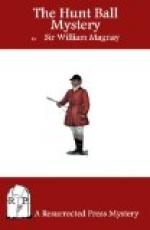“I certainly don’t want you to be in too great a hurry,” Gifford returned calmly.
“But why? Why?”
“I feel it is a mistake.”
Kelson laughed. “You are not going to suggest we don’t know our own minds.”
“Hardly. But why not wait till the family returns? Of course it is no business of mine.”
“No,” Kelson replied with a laugh of annoyance; “and you can’t be expected to enter into my feelings on the subject. But I think you might be a little less grudging of your sympathy.”
“You quite mistake me, Harry,” Gifford replied warmly. “It is only in your own interest that I counsel you not to be in a hurry.”
“But why? What, in heaven’s name, do you mean?” Kelson demanded, vaguely apprehensive.
“It is a mistake to rush things, that is all,” was the unsatisfactory answer.
“If I saw the slightest chance of danger I would not hesitate to take your advice,” Kelson said. “But I don’t. Nor do you. Since when have you become so cautious?”
Gifford forced a laugh. “It is coming on with age.”
Kelson clapped him on the shoulder. “Don’t encourage it, my dear Hugh. It will spoil all the enjoyment in your life, and in other people’s too, if you force the note. I promise you I won’t hurry on the wedding more than is absolutely necessary.”
“Very well,” Gifford responded, and the subject dropped.
They had finished dinner, at which the absorbing subject of the tragedy at Wynford Place was the main topic of their conversation, when the landlord came in to say that Mr. Gervase Henshaw, who was staying at the hotel, would like to see them if they were disengaged.
Kelson looked across at his friend. “Shall we see him?”
Gifford nodded. “We had better hear what he has to say. We don’t want him worrying Morriston.”
“Ask Mr. Henshaw up,” Kelson said to the landlord, and in a minute he was ushered in.
With a quick, decisive movement Henshaw took the seat to which Kelson invited him.
“I trust you won’t think me intrusive, gentlemen,” he began in his sharp mode of speaking, “but you will understand I am very much upset and horribly perplexed by the terrible fate which has overtaken my poor brother. I am setting myself to search for a clue, if ever so slight, to the mystery, the double mystery, I may say, and it occurred to me that perhaps a talk with you gentlemen who are, so far, the last known persons who spoke with him, might possibly give me a hint.”
“I’m afraid there is very little we can tell you,” Gifford replied. “But we are at your service.”
“Thank you.” It seemed the first civil word of acknowledgment they had heard him utter. “First of all,” he proceeded, falling back to his dry, lawyer-like tone, “I have been to see the medical man who was summoned to look at the body, Dr. Page. He tells me that, so far as his cursory examination went, the position of the wound hardly suggests that it was self-inflicted.”




